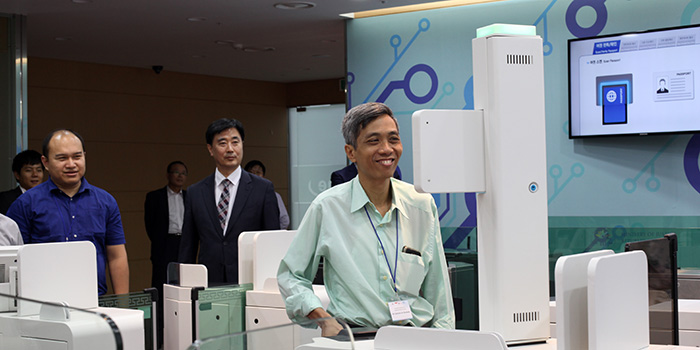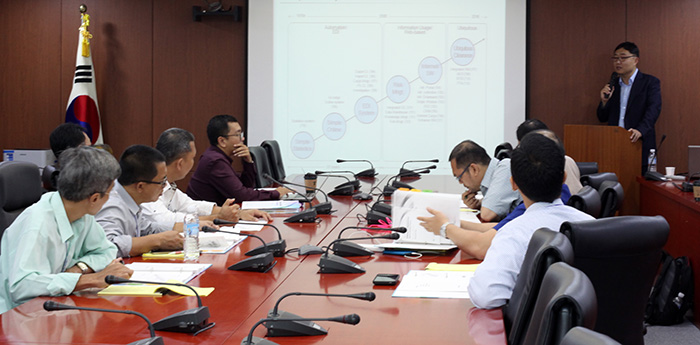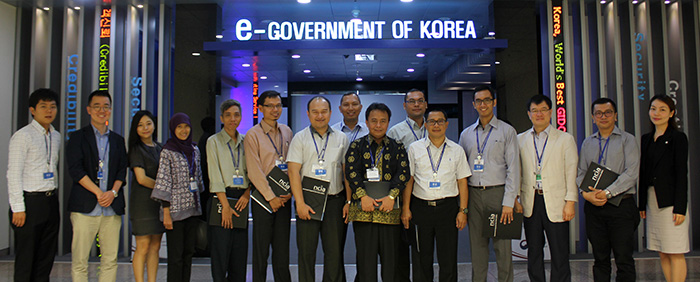-
 Korea.net's 24-hour YouTube channel
Korea.net's 24-hour YouTube channel- NEWS FOCUS
- ABOUT KOREA
- EVENTS
- RESOURCES
- GOVERNMENT
- ABOUT US
On July 18, the Ministry of the Interior welcomed a group of official guests from Indonesia.
Ten civil servants from Indonesia’s ministries of administrative reform, communication & information and of national development planning, as well as from the Presidential Office of Indonesia, visited Seoul to check out firsthand some of the trials, errors and successful implementations the Korean government has undergone as it pushes ahead with the development of online and tech-enabled government services, or e-government.
The Indonesian guests took part in a training program that aimed at enhancing their capabilities at running and managing their own version of e-government services back home. Running until July 28, the program allows them to fully comprehend the policies that the Korean government has put in place to operate its online government services, as well as learn more about online systems used in civil affairs and for immigration control.
The group also paid a visit to IT centers and firms that offer e-government services, such as the National Computing and Information Service (NCIS), the Seoul Transport Operation & Information Service and LG Display.
This training program was part of joint projects being carried out by the ministry and the Korea-Indonesia Electronic Government Cooperation Center, a center that the two governments jointly established in Jakarta in March this year.


Ideally, the visiting civil servants want to learn about e-government services that “satisfy the public.” According to a 2015 E-government Satisfaction Index released by the Ministry of the Interior on July 25, more than 93.6 percent of the 4,000 people surveyed, ranging in age from 16 to 74, said that they are satisfied with the central government's range of electronic and online services.
The highest satisfaction was found among those between the ages 16 and 19, of whom 93.8 percent said that they were satisfied, followed by 93.8 percent of people in the 20s, 93.1 percent of people in their 30s, 83.8 percent of people in their 40s, 69.3 percent of people in their 50s and, lastly, 34.7 percent of people between the ages of 60 and 74.
Most e-government services are involved with the search for information, and to make applications for and to search for civil affair documents, such as birth certificates and passports, or national health or tax records.
When asked why they keep using the online government services, 29 percent said it was for “the quick handling of civil affairs,” 28.5 percent said due to the “easy availability, at any time and any place,” and 19.5 percent said because of the “easy access to information and services on offer.”

By Sohn JiAe
Korea.net Staff Writer
Photos: Ministry of the Interior
jiae5853@korea.kr
Ten civil servants from Indonesia’s ministries of administrative reform, communication & information and of national development planning, as well as from the Presidential Office of Indonesia, visited Seoul to check out firsthand some of the trials, errors and successful implementations the Korean government has undergone as it pushes ahead with the development of online and tech-enabled government services, or e-government.
The Indonesian guests took part in a training program that aimed at enhancing their capabilities at running and managing their own version of e-government services back home. Running until July 28, the program allows them to fully comprehend the policies that the Korean government has put in place to operate its online government services, as well as learn more about online systems used in civil affairs and for immigration control.
The group also paid a visit to IT centers and firms that offer e-government services, such as the National Computing and Information Service (NCIS), the Seoul Transport Operation & Information Service and LG Display.
This training program was part of joint projects being carried out by the ministry and the Korea-Indonesia Electronic Government Cooperation Center, a center that the two governments jointly established in Jakarta in March this year.

Indonesian civil servants try one of the Korean government's new automatic immigration control systems, part of a training program that helps them to understand the nation’s range of e-government services.

Indonesian civil officials attend an 11-day training program designed to give them a better understanding of Korea’s online and tech-enabled government services.
Ideally, the visiting civil servants want to learn about e-government services that “satisfy the public.” According to a 2015 E-government Satisfaction Index released by the Ministry of the Interior on July 25, more than 93.6 percent of the 4,000 people surveyed, ranging in age from 16 to 74, said that they are satisfied with the central government's range of electronic and online services.
The highest satisfaction was found among those between the ages 16 and 19, of whom 93.8 percent said that they were satisfied, followed by 93.8 percent of people in the 20s, 93.1 percent of people in their 30s, 83.8 percent of people in their 40s, 69.3 percent of people in their 50s and, lastly, 34.7 percent of people between the ages of 60 and 74.
Most e-government services are involved with the search for information, and to make applications for and to search for civil affair documents, such as birth certificates and passports, or national health or tax records.
When asked why they keep using the online government services, 29 percent said it was for “the quick handling of civil affairs,” 28.5 percent said due to the “easy availability, at any time and any place,” and 19.5 percent said because of the “easy access to information and services on offer.”

Indonesian civil servants pose for a commemorative photo during their tour of an e-government center in Seoul.
By Sohn JiAe
Korea.net Staff Writer
Photos: Ministry of the Interior
jiae5853@korea.kr
Most popular
- First hearing-impaired K-pop act hopes for 'barrier-free world'
- 'Mad Max' director impressed by 'cinema-literate' Korean viewers
- Romanian presidential couple visits national cemetery
- 'Korean mythology is just as wonderful as Greek and Roman'
- Hit drama 'Beef' wins awards from 3 major Hollywood guilds













